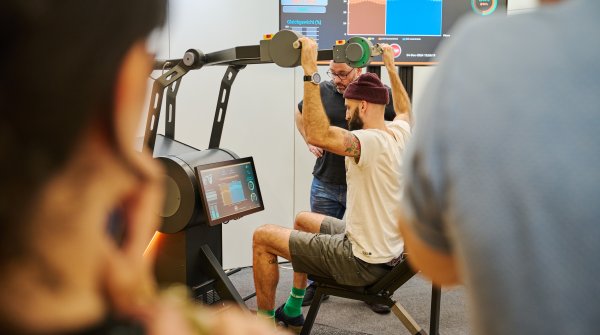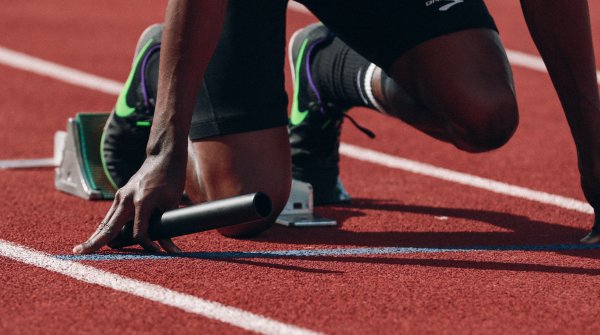
Mental strength for achieving athletic goals is important, and one component of that is Mindfulness. To find the right balance between motivating incentive and unhealthy ambition, there are a number of things to keep in mind during training. Indeed, international studies also show that mindfulness and self-care are not self-sustaining. On the contrary, they can exacerbate psychological problems. American psychologist Dr. David Udelf doesn't use the term mindfulness at all because it has negative connotations for so many people, he says. "Why does it have a negative connotation in the public mind? Because most practitioners who use it don't explain its purpose."
Mindfulness is a state of active, open attention to the present. This state is described as observing one's thoughts and feelings without evaluating them as good or bad. Here's how the journal Psychology Today defines it.
"The problem with mindfulness is the misunderstanding of its purpose by professionals. The purpose is not to feel better," says renowned psychologist Dr. David Udelf. That would be the opposite of Contextual Behavioral Science (CBS) and Acceptance and Commitment Training (ACT), an approach that he says is revolutionizing the practice of performance and clinical psychology. That's because, CBS and ACT don't try to eliminate disturbing emotions and thought fluctuations. ACT trains "psychological flexibility," the ability to deal effectively with unwanted thoughts, emotions and bodily sensations.

The real purpose of "focus training," according to Dr. Udelf, is to enable people - in this case, athletes - to be present and in the moment. "So they can do what matters: perform the actions required to execute the skills they've been trained to do."
That's because athletes of all ages and abilities experience unwanted thoughts and feelings, or fatigue and muscle soreness, that can distract them and interfere with their optimal performance. Dealing with these things or trying to ignore or change them is a trap many athletes fall into. This leads to an internal struggle that exacerbates these internal distractions. His advice is to focus on the actions and skills necessary for successful performance. This is far more effective "than struggling with the inner stuff”.
At Tristyle the sports science training institute run by Austrian Lissi Niedereder, the first thing on the agenda is an interview to find out what goals the customers have in mind. The second step is a multi-stage lactate test. This is the basis for every training plan - regardless of whether the customer is a competitive or a health athlete. "And with that, a lot of things are already obsolete, because some people come with goals that are completely unrealistic." And then it's her job to interpret the values and make a forecast - in terms of medium- and long-term goals.

For extreme mountaineer David Göttler it is "always important to be able to reflect and honestly assess oneself. He needs that in order to develop further and stay healthy. "I can happily set myself very big goals that are unattainable at the moment, but then I also have to accept that it will take me a very long time to achieve them here." The German therefore recommends: dividing goals into different categories. "These are once the very big ones, which sometimes need many years or even a whole life to be realized." Then, of course, there are the small daily goals, such as completing a training session well or simply taking a day of rest in a relaxed manner, he says. "And everything in between," says the professional mountaineer with a laugh, who knows what he's talking about: In May of this year, he reached the summit of Mount Everest without the aid of artificial oxygen - on his third attempt.
Similar to Göttler adventurer Jonas Deichmann who circumnavigated the globe in a triathlon in 2021: "I break down the big goals into smaller goals. If day 1 was hell in the swim, then I don't say, that was just ten kilometers now and there are 450 kilometers to follow. That is extremely demotivating. Arriving is my vision. But my goal is the next rock, the next gas station, the next candy bar. I just keep swimming to the next candy bar."
Whether you are a competitive athlete or a health athlete - everyone trains differently. But all athletic training involves goals. It doesn't matter whether the goal is to complete a ten-kilometer run in a certain time or to jog three kilometers at a stretch. For very few people, it works completely without a goal. "Personally, I don't do so well with that," alpinist Göttler openly admits. He needs a goal. "And I have big, small and intermediate goals. That way I can always train in a targeted manner and my motivation is nice and high. I also know how and what I need to train, what I need to improve on. Without a goal, I would lack the compass here in which direction I need to work."
Lissi Niedereder, former Austrian top athlete and current coach, describes the crux with the goal like this: "At the latest since March 2020, we know: sport also makes sense without having a competition as a goal. Due to the Corona Lockdown, many season goals were postponed to a later date. Some of my athletes had a hard time coping with this, since the competition was also the reward for months of a hard training program." But health athletes enjoyed this time because they were "happy to finally have enough time for training, recovery and a balanced diet.
"For me, the joy was always in the foreground," emphasizes Olympic champion Christian Schenk. "So when someone tells me that professional sport is a psychological burden, I think the approach is wrong. Of course I say in my book that pain and sport are like Siamese twins for me. We high-performance athletes are all masochists. And of course, in individual sports, you have to constantly push the boundaries."
For Deichmann, 95 percent is a headache. "The limit is only me" - is not only the title of his book, but this message is directed at everyone*. "I'm just always convinced that I can do something. And if you have a dream, believe in it strongly, and are positive, you can achieve so much more than you think is possible."

To stay healthy while pushing boundaries, Dr. Udelf recommends, "Activate yourself after a success or failure and focus on the process. What are the actions you will take? After the game or competition - win, lose or draw - identify what you need to improve (performance goals) and what you need to practice or train to achieve those goals (process goals)." Adding, "When the going gets tough, the tough take action."
According to recent studies, including those by the American College of Sports Medicine there is evidence that injury risk and athletic performance are significantly related to well-being. Recent research has examined how mindfulness can enhance athletic performance, improve athletes' mental health, reduce injury risk, and even facilitate recovery from injury. Other studies demonstrate that the use of psychologically-based intervention by athletic trainers and sports therapists can effectively reduce injuries in athletes. Sports medicine practitioners* can also help athletes reduce stress, increase mindfulness, and address mental health to reduce injury risk (Source: Journal of Sport Rehabilitation).
"The potential dangers of mindfulness: the facts about mindfulness that no one talks about," writes Jason N. Linder, Ph.D., in an article for Psychology Today. Mindfulness, he says, has been over-hyped, misunderstood and over-commercialized. "It is widely ignored that more than 20 published reports or studies have already described mindfulness or meditation experiences that were serious or frightening enough to prompt additional treatment or medical attention," Dr. Linder points out. For people with trauma and depression in particular, meditation could lead to a deterioration in their mental health, he said. This has been pointed out by both the American Psychological Association and the US National Institute of Health (NIH).

The psychologist warns, "Practicing mindfulness when you're not mentally ready, or when you actually need a nap, something to eat, a massage, work, or an important conversation with a loved one, can clearly cause more trouble than it's meant to mitigate." Moreover, she says, mindfulness meditation is just one of many tools, practices and strategies for promoting well-being, awareness and calm. So Dr. Linder recommends, "It's important to have a few others in your toolbox and learn when to learn or practice the others and when not to."
Extreme mountaineer David Göttler works regularly with a mental coach, and says, "The more sensitive and honest you are with yourself, reflecting on what your weaknesses are, and also always honestly checking the status quo, the better and more satisfied you will be in achieving your goals."
In summary, mindfulness, or "focus training" as Dr. Udelf calls it, "aims to become present so we can pay attention to what we are doing. It's not meant to make you feel better, although it can be calming, but that's not the main purpose."
To switch off and relieve stress, finds ex-professional athlete Niedereder mindful running is ideal. The 26-time Austrian national champion has once again intensified her focus on mindfulness after ending her career and breaking the doping law. "It's important to be on the go for at least 30 minutes so that stress hormones, for example, can be released. That's why endurance sports are so grateful." While it's also "great" to power out for ten minutes during high-intensity strength training (HIT), he says, "it often just gives you more stress." And slow, calmrunning is simply ideal.

For many years, Dr. Tatjana Reichhart, a specialist in psychiatry and psychotherapy, has been working on the topic of self-care and mindfulness. Just recently, she published her second book "Self-Determined: How to manage expectations and live an authentic life." She recommends the following mindfulness exercises as examples for everyday (sports) life:
- Every morning and evening while brushing your teeth, ask yourself: How am I feeling physically? How do I feel (psychologically, mentally)? What do I need?
- End the evening with a positive review of the day. What went well and what part did I have in it? If thoughts digress, for example into the negative - what didn't work out or what still needs to be done (i.e. thoughts into the past or future) - notice this and focus again on: What went well?
- Using sports again and again as a mindfulness exercise without a training goal: for example, swimming or trail running. Then it is a matter of noticing the sensory impressions and directing the focus on what you see (forest, trees) or feel (water, ground under your feet), what you smell or hear. So away from the specific goal, towards pure perception in the here and now without evaluation.
- In everyday life: away from multitasking to one thing at a time! When I eat, I eat. When I read a book, I don't look at my cell phone at the same time. When I'm talking to someone, I listen carefully. This increases the ability to maintain one's focus, gives energy, and reduces stress or feelings of being out of control.
- The same is true with sports. I do what I am doing with full attention. If the thoughts drift, I notice that and come back to my focus with my attention.

- Awards
- Mountain sports
- Bike
- Fitness
- Health
- ISPO Munich
- Running
- Brands
- Sustainability
- Olympia
- OutDoor
- Promotion
- Sports Business
- Textrends
- Triathlon
- Water sports
- Winter sports
- eSports
- SportsTech
- OutDoor by ISPO
- Heroes
- Transformation
- Sport Fashion
- Urban Culture
- Challenges of a CEO
- Trade fairs
- Sports
- Find the Balance
- Product reviews
- Newsletter Exclusive Area
- Magazine





